CAMRA – An interview with the UK Chairman
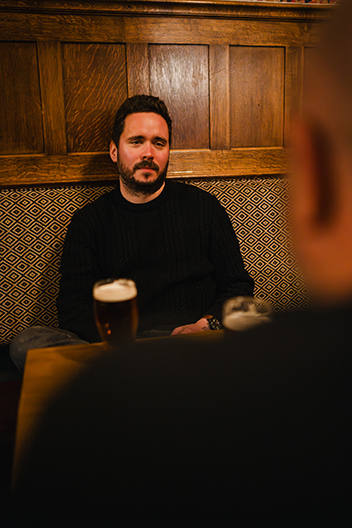
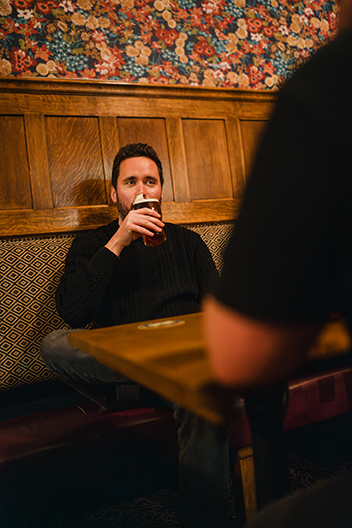
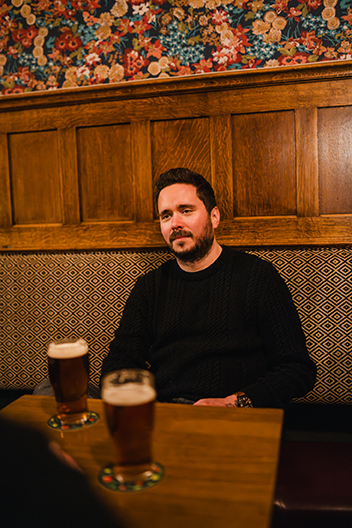
Ash Corbett-Collins – An Injection Of Positivity Into CAMRA
I’ve been watching CAMRA closely from the sidelines for a number months now. I knew there had been a change in leadership, and it was a creeping realisation that I was drinking in the same pubs as that person. We’ve been occupying the same local orbit, and it focused my attention. I started to notice a shift in gears within the public face of the organisation, but I am usually very observant. Not everyone is. So this is my attempt to help spread the word that things have changed. Speak to most people and ask who they think is the new Chairman, and they’ll probably tell you it’s yet another 60 something year old, with a thick knitted jumper and a pipe. Ash is about as far from that as it gets. He is young, tattooed, and candid. His enthusiasm for ale is infectious.
I’ve spoken to many people over the years about CAMRA, and there has been a growing sense of unease at the direction it has been going in, or rather the lack of. In a changing world, people’s opinions have largely been that the organisation lacked the ability to change accordingly. I’ve kept an open mind, as I know that CAMRA has always served a very important function. However, now I’ve met Ash, I can probably say that they were right. The difference is palpable.
Ash has been a known face on the Burton on Trent beer scene for some time, and an avid CAMRA member there. He was first appointed to the National Executive in 2018, and subsequently vice Chairman after that in 2023. Ash then performed as acting Chair when Nik Antona stepped down last year. Ash’s temporary tenure turned permanent when he was then voted in formally toward the end of 2024.
I suggested meeting up for a chat, and he was keen. In his words, ‘what’s not to like about meeting up, having a beer and talking about beer?’. This is exactly the can do attitude that comes across when he talks about the role. He is passionate, positive and realistic.
I posed Ash a number of questions, ranging from straight forward, through to some I honestly didn’t think he’d answer, and he was about as open as possible. Read on, and I hope you enjoy it. (and something worthy of note – all photographs used are lovingly taken by and subject to copyright of Hank and Margot)
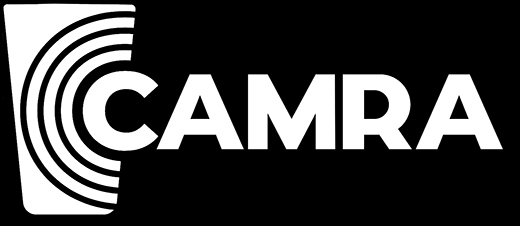
CAMRA – the questions.
Hi Ash! Firstly, let’s start light! How long have you been in the post of CAMRA Chairman?
I took over on an interim basis back in August, when my predecessor Nik stood down, and then I was elected to the position properly in September. So it’s been almost six months with a rather step learning curve!
What are you enjoying about the role so far?
I love the opportunity to really get my teeth into campaigning and celebrating great beer and pubs. There’s been lots of hard work – meetings with civil servants, talking at party conference events, plus leading the Campaign day-to-day. But that also comes with the fun bits. I’ve helped present our national Pub of the Year award to the Bailey Head in Oswestry and Club of the Year to The Firs in Codsall, near Wolverhampton.
For people that don’t know a lot about you, what things do you think people would be interested about you, as a person in the hot seat?
Probably that I’m not just a beer guy! I think there’s a bit of an assumption that if you’re involved a lot with CAMRA that you’re a bit of an anorak when it comes to beer and pubs. Don’t get me wrong, it’s a huge part of my life. But like everyone I have other interests and hobbies. It also might surprise people that CAMRA isn’t my job. I usually get asked what it’s like to work for CAMRA and I have to tell them that I do this all in my spare time around the day job!
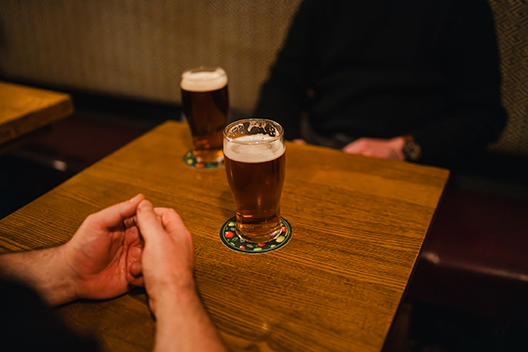
For the people reading this that don’t know a huge amount about CAMRA, what do you see as the guiding principles of CAMRA?
Our focus is on ensuring that there is quality and choice on the bar and that the pub will continue be there to serve it. We started in the 70s because people were concerned that the new influx of keg lagers were pushing traditional British cask beer off the bar and into extinction. Today people might look at the beers available in their local and think that the battle has been won. But behind the scenes our breweries and pubs are facing a real battle to survive. Our aim is to help people learn more about this fight, give them the tools to campaign, and make a real change.
If you are allowed to say, impartiality and all, what are your current top three breweries? Or even, do you have any favourites that are on the ascendancy?
Until recently I lived in Stirchley, so it would be easy to say Attic, Birmingham Brewing Company, and Glasshouse. All three are great breweries who put emphasis on good quality beer in both cask and keg, and I’ve spent many hours in their taprooms.
Alongside these, I’m always excited when I see Brew York and Vocation beers available. I’m yet to get to Brew York’s taproom, but a couple of years back I was in Sheffield and spent an entire Sunday afternoon and evening in the Vocation bar in the city centre, which was great.
Since you have been in the role, what are the great things you’ve seen that are an opportunity for CAMRA to build on?
The biggest strength CAMRA has is enthusiasm. I’ve just got back from a weekend in Northern Ireland, where I spent time with local members discussing the challenges they face to keep cask on the bar. In Northern Ireland they have a draconian process called the Surrender Principle. This limits the number of pubs that can open and it’s essentially a one-in-one-out scenario, with lots of money needing to change hands to do so. This plays right into the hands of the global brewers, like Diageo, for who it is in their interests to keep things as they are, and limits the opportunities for small craft brewers to get a foot in the door. That said, the members there are still keen to keep fighting to give drinkers choice, no matter how uphill the battle.
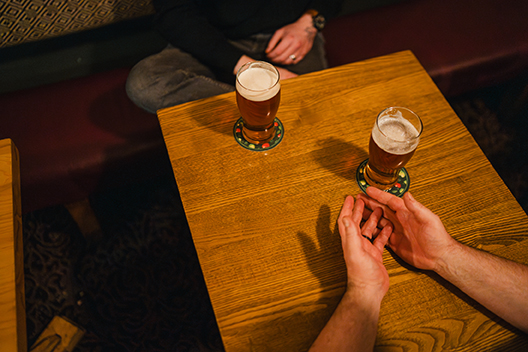
Contrary to the previous question, in the short time you have been in post, are there any things needing attention that you feel you need to address? Or as a side question, what have you put into place so far in your short time in the role?
The change I really want to make is to cut down on unnecessary meetings and focus on what makes CAMRA fun! It can be easy to slip into traditional models of meetings and reports, because that’s what has worked in the corporate world for years. But CAMRA is first and foremost a social campaigning group. If we keep that in mind then we’ll continue to thrive.
Some people may not know that you are a fair bit younger than the typical CAMRA chairman. What do you think that you bring to the table as a younger person in the role than normal?
One of the reasons I stood for the role is that I think it’s important to show that CAMRA membership and a passion for good beer and pubs, crosses all ages. It’s probably one of the reasons our staff have been keen to push me in front of cameras and on to radio shows since I took it on!
What (if any) changes have you bought into place so far, since you took the role?
The first change I’ve tried to emphasise is more vocal support for independent breweries. That’s demonstrated in our support for SIBA’s Indie Beer campaign and us being more pushy in public when it comes to speaking truth to power about certain global brewers and pub-owning businesses that aren’t giving our breweries the support they need.
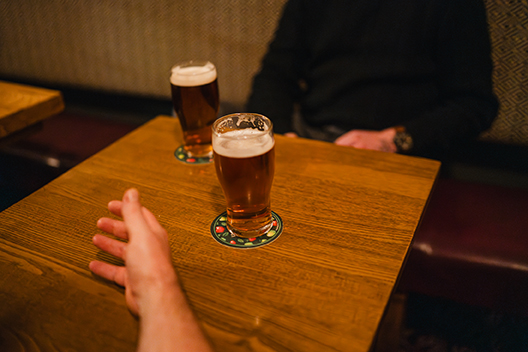
Are there any future changes that you can talk about, that might get people’s attention?
That we’re bringing the Great British Beer Festival to Birmingham! GBBF is one the UK’s biggest beer festivals, it’s CAMRA’s flagship event and for as long as I’ve known it has been held in London. So the fact that we’re bringing it to Birmingham and the NEC is great news. We’ve not had a CAMRA beer festival in the city for a while now so this is a real opportunity to reignite passions for cask beer and campaigning in the second city.
How much do you think that Real Ale matters in the 21st century? (with one eye on breweries, for example, making ale that is not cask conditioned but still hand pumped)
Proper, traditional handpump beer is probably one of the most defining things of the Great British pub and has got to be up there for Britain in general. When someone like Al Murray does his Pub Landlord routine, he always has a faux bar with handpumps on stage. We get millions of tourists to this country every year and the vast, vast majority of them say visiting a British pub and having a proper British pint is on their bucket list. I think it was the beer writer, Pete Brown, who said something like along the lines of that if the French government treated champagne the way pubs and beer have been neglected in this country, there would be riots in the streets of Paris. Cask conditioned beer is our champagne.
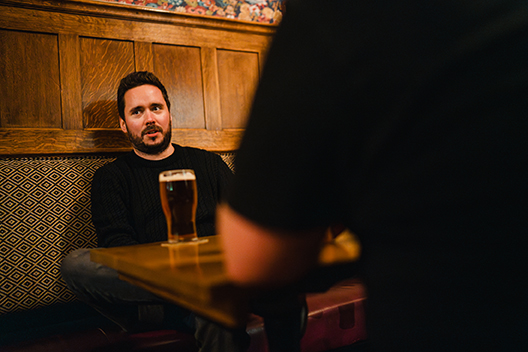
With so many nuanced types of beer production getting more popular, do you think that the definition of Real Ale needs to be updated? Do you have any plans to?
It’s interesting, because I don’t think anyone drinks certain beer because they love the definition. We drink it because we enjoy the taste and the smell. Because we enjoy how it makes us feel and that we associate it with certain memories. If I think about my own experience drinking cask beer, I found out what I liked best through trial and error at university, working my way through lagers, Strongbow and Guinness, before settling on cask. It was only afterwards when I wanted to try more of it, did I start to define what it was, and I became a CAMRA member because I wanted to learn more about it and help promote it.
As an organisation, it’s important to us that we have a clear definition of what it is we campaign for. And a few years back we did update this, recognising that real ale was a bit too vague and instead we defined ‘live beer’ – the more technical-sided language that refers to still living beer in any container, as long as it meets our requirements, and ‘cask-conditioned beer’ – which is the stuff on handpump that people typically associate with CAMRA.
Following on from the above, for a while now the subject of key kegs within CAMRA has been a bit divisive. In some people’s eyes, key kegs hit the relevant requirements for being classed as Real Ale. Other people argue against this. What is your stance on this?
Keykeg is great because as long as the beer inside is live then it meets our definition, and is a bit easier to keep than cask. CAMRA has supported keykeg beers I think as long as I’ve been a member, so over a decade. I understand that some members still prefer cask and that they want us to favour one over the other, but it again boils down to supporting great beer in general and giving publicans more options to serve it. We’ve got another great brewery in Birmingham, Burning Soul. Pretty much all of their beer is keykeg, but it’s live beer and they’re a perennial inclusion in the Good Beer Guide because of it.
Ok, so they recently bought minimum pricing in, in Scotland. Do you think there is any scope for a similar thing south of the border? If so, do you think it would help in terms of making the playing field more level? Or do you think that it could spark something negative?
Officially, CAMRA is neutral towards minimum unit pricing. If it is introduced in England, as it has been in Scotland and Wales, then we ask that it is no more than 50p a unit and isn’t raised by more than the consumer price index after that. But the truth is there just isn’t enough research to demonstrate that it supports the on-trade by incentivising people to drink in pubs rather than having cheap alcohol at home. And my personal concern is that raising the cost of one thing only reduces the money people have to spend on another. Most of us like to have a drink at home as well as go to the pub. If it costs more and more to have a glass of wine with dinner at home, I don’t see how that pushes someone into the pub.
The current benefit of money off vouchers to new and existing members; how big a part do you think that this has on enticing new members and retaining existing members?
We know from research that about 40% of our members join because they appreciate the benefits membership offers – whether that’s free entry to beer festivals, money off at their local or the voucher scheme. Some people take the position that if you’re campaigning for the survival and success of beer then you shouldn’t be encouraging people to pay less for it. But we are living through a cost of living crisis and even before that we knew that well over half of Brits think a pint is no longer affordable. It’s a balance. We want to ensure that people can afford to go to the pub by offering them a small discount, but at the same time we need to continue to help people understand why beer costs so much. I’m yet to meet a publican who got into it to get rich – they are just as passionate as the beer drinkers.
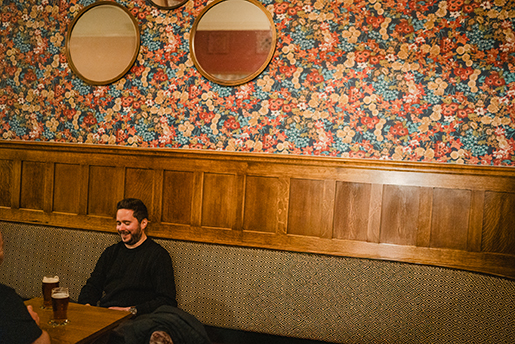
On member numbers, with the publicised drop in drinkers under 25, do you have any plans in place to rebalance the average age of the CAMRA member?
In the 70s and 80s, CAMRA members were typically young, passionate campaigners trying to right the wrongs of the world. Fifty years later, we’re fortunate that so many have stuck by us and are still involved. But we recognise that as the average age of a CAMRA member creeps up, that presents challenges, particularly for more physically demanding voluntary roles such as setting up our beer festivals. But I don’t think we’re going to see an influx of young members any time soon. Being involved in any voluntary organisation often requires time commitments that many don’t have. People are also more likely to get involved in something like CAMRA once they have settled in any area and have established roots. Again, young people are more likely to be transient, moving to different areas and towns for work or when forced to due to renting. We obviously want to encourage any younger person who enjoys beer and pubs to join, but we are targeting our recruitment at those in their 40s and 50s – their careers are settled, maybe any kids they have are a bit older, and they have more time to get involved with CAMRA – and those who are a built older still, maybe newly retired and looking for a way to meet new friends and have a hobby.
Since the pandemic, are you aware of any differences in sales between cask and craft/keg? Mainly from a point of view of cask ale becoming more popular over the past 2 or 3 years.
Beer production in general has actually overtaken pre-pandemic levels for the first time, which is great news, and cask volume specifically is up 10% year on year. But when we look at the proportion of beer drinkers who say they drink cask, that has actually gone down from 39% to 37% over the last twelve months. So we’re drinking more cask beer, but fewer of us are drinking it. And when it comes to young people, that figure is only 16% and for women it’s less than one in four. I’d like to see that change. Cask is a drink for everyone – there’s nothing to suggest one demographic should like it more than another, other than the culture around it. And I think CAMRA has a role to play in improving that culture and showing that cask is for everyone.
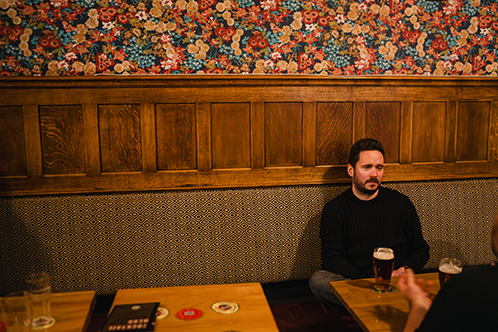
Do you see craft beer bars as a threat, or (with many installing a hand pull over the past year or so), maybe an opportunity to CAMRA, and therefore possibly an ally?
The worst pub is a closed one. It’s simply much harder to reopen a pub than it is to convince an open one to start serving cask beer. I don’t see any venue as being a threat.
It comes back to the idea of choice. In an ideal world, every city, town and village would have a mixture of venues that meet the needs of all the people who live there. So a community pub, a cocktail bar, a craft beer shop, and so on. We’re lucky that here in Birmingham we have a good choice. But that’s not the case across the country, which is a real shame.
It’s a known fact that the ‘Great British pub’ is in decline with record numbers closing monthly. In some remote villages, there are only one pub left (or none). Would you consider supporting some of these pubs if they just don’t happen to sell real ale? This comes from the broader context of cask only having a short shelf life, and sometimes it just isn’t financially practical.
CAMRA isn’t just a beer organisation. We campaign for pubs, regardless of what they serve. Though of course we’d love it if they did serve cask beer if it were viable for them. We recognise that isn’t always the case, but an open pub is always an opportunity for local drinkers to ask for cask. A closed one isn’t.
And in terms of supporting all pubs and breweries, we were instrumental in convincing the last government to introduce preferential duty on draught beer and we pushed for the introduction of the Scottish Pubs Code. Both of these successes benefited pubs and breweries regardless of the specific liquid they brew or sell, because we want to support a healthy pub industry across the board.
And finally, if you could leave a lasting impression, in a sentence, to convince somebody to join CAMRA, what would you say to get them interested?
CAMRA is a bit like trying a new beer or a new pub – it might be a little daunting at first, you might want to stick with what you know, but I’ve found that by putting myself out there I’ve been able to learn a whole lot, make a big difference and meet plenty of new friends.
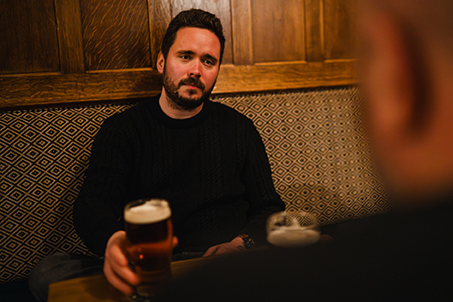
Summary – some post interview thoughts
And there you have it. Some very straight talking from the newish leader of CAMRA. Ash sees no point in pussyfooting around. Incidentally, and probably for the record, Ash wasn’t responsible for the logo change. It was instigated prior to his arrival, and happened after his tenure started, so people think it was his doing. Regardless, he came across as somebody that was tremendously passionate about driving things forward.
I keep myself out of the limelight, but now Ash knows who I am, I’m sure he will see me everywhere from now on. A bit of Baader–Meinhof doesnt hurt anyone. 🙂
Thanks for reading, and I hope you got something out of it. Oh, and remember to drink responsibly! Thanks.
If you want to read more tips about where to find the best independent food and drink in Birmingham, click here to visit my website and subscribe to the B Town Social newsletter! I also have an interactive map which lots of people are already finding helpful.
Drop me a comment